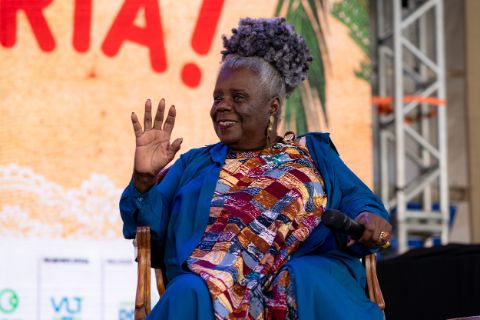Escrevivência: Chewing on the Silences of History and Memory
Keynote by Conceição Evaristo, followed by a conversation with Eliana Alves Cruz, and Julio Ludemir
Keynote, Discussion
Fri., 10.10.2025
18:00–19:15
Safi Faye Hall
In Portuguese with simultaneous translation into English and German
Free entry

Conceição Evaristo. Photo: Festa Literária das Periferias (FLUP), 2024
Escrevivência, a word author and poet Conceição Evaristo gave to the world, fuses the Portuguese words for writing (escrever) and living (vivência) to describe a single practice. This way of storytelling is rooted in lived experience, where the memory of one life is inseparably linked to the history of many. In Evaristo’s novel Ponciá Vicêncio (2003), she traces the story of a young woman, moving from the rural homeland of her enslaved ancestors to the city, illuminating the struggles faced by Afro-Brazilians in both rural and urban settings. The author’s powerful prose weaves together these observations of everyday realities with spiritual motifs and themes of family, resistance, and ancestral memory. In her keynote for Middle Ground, Evaristo invites us to think of literature as a way of ‘chewing on silences’, to work through the omissions rendered by colonialism, racism, and patriarchy until they yield new meanings. This is not a gentle act but a resistant one; turning absence into presence and wound into word.
After her keynote, Evaristo is joined by author Eliana Alves Cruz and curator Julio Ludemir to reflect on how Brazilian literature continues to wrestle with what remains unsaid. Cruz, whose award-winning novel Água de Barrela (2016) traces the chronicle of a Black family across nine generations, writes with a precision that troubles the official archive. Ludemir is co-founder of the Festa Literária das Periferias (FLUP) and has long created spaces where marginalized voices rewrite the canon.